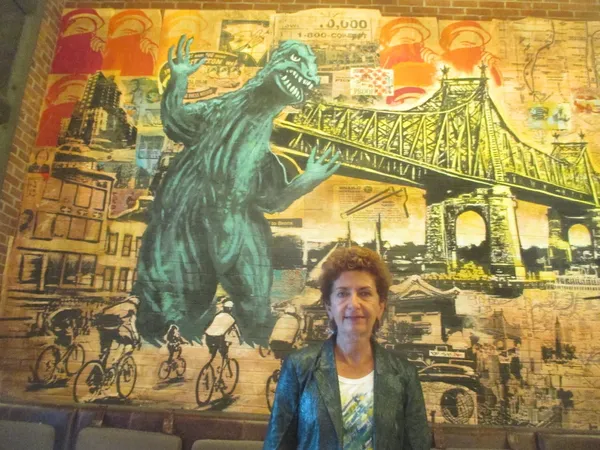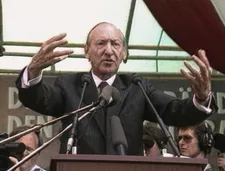 |
| The Waldheim Waltz director Ruth Beckermann: "Roland Barthes wrote that it's strange that some people when they speak about culture, they go back to nature." Photo: Anne-Katrin Titze |
Ruth Beckermann's documentary on Kurt Waldheim, The Waldheim Waltz, is Austria's Oscar submission for Best Foreign Language Film and was a Spotlight on Documentary selection of the 56th New York Film Festival. The director, cinematographer, writer, narrator and producer of The Waldheim Waltz, edited by Dieter Pichler (Constantin Wulff's Ulrich Seidl: A Director At Work) joined me for a conversation at the Hudson hotel the afternoon following her New York festival première at the Walter Reade Theater of the Film Society of Lincoln Center.
Roland Barthes and nature, Claude Lanzmann and Shoah, US Congressman Tom Lantos and Kurt Waldheim's son, Austrian folklore and an American-style election campaign came up in the first instalment.
 |
| Ruth Beckermann on Kurt Waldheim's presidential run: "They tried to have an American-style campaign. That's not usual in Austria that the family is involved." |
Waldheim, who served as Secretary-General of the United Nations between 1972 and 1982, decided to return from New York to Austria and run for the presidency of his country in 1986. It was during this campaign that the politician's Nazi-era past came to the surface. His denial of having had any knowledge of deportations and massacres in Greece while he was stationed there as an intelligence officer, led to scores of demonstrations.
Beckermann's own video footage of rallies in Vienna, where pro- and anti- Waldheim protestors clash, forms the backbone of this documentary that stretches out into the past to shed light on aspects of the present. Austria had played its card as Hitler's first victim for far too long after the war. Through the reckoning of what was known as the Waldheim Affair, the world took notice.
Anne-Katrin Titze: You say at some point in the film that it was in 1986 with the Waldheim affaire that the lies about "Austrian victimhood were crumbling." Why did it take so long?
Ruth Beckermann: Because it was a practical arrangement. The world wanted to believe it. And it was good for Austrian tourism - combined with the beautiful landscape. I know people who said "I would never go to Germany, but I come to Austria." They got independence in 1955. The Allies left the country. So they had many advantages compared to Germany. And it took that long because 1968 in Germany was the turning point. Austria is slow.
AKT: '68 and '86 - just reverse the numbers. How did it feel to go back to the footage you filmed in 1986? Re-watching it, knowing that this will become a film now? It's very timely, unfortunately.
 |
| Ruth Beckermann is holding up one of the protest signs in the archival footage from 1986 shown in The Waldheim Waltz |
RB: Yes, you see, at the time I didn't take my own camerawork seriously. It was the first time I had a camera in my hands. So when I watched it recently, I thought, well, well done. It's not bad the way I was filming. Unfortunately I didn't film more.
It's strange when you look back - some of the people are dead already, some of my friends. And some are still my friends. It's like a family film in a way. At the première in Vienna last week there were so many people who are in the movie, which is rare when you do a documentary.
AKT: I suppose, Waldheim's son didn't come?
RB: No.
AKT: What is he doing now? His appearance is one of the highlights of your film.
RB: Definitely. The distributor wanted … We decided to send him a DVD because he should see the film in private.
AKT: Not with an audience, right.
RB: But he didn't react. He lives in Germany.
AKT: In that scene where the son is at the hearing, trying to defend his father, Tom Lantos is so fantastic asking him questions.
RB: You almost feel pity with the son.
 |
| Horse lover Kurt Waldheim is mocked on the streets of Vienna. |
AKT: Almost. Because Lantos is so calm and precise.
RB: I don't understand why the son did that.
AKT: He didn't have to.
RB: No, it probably was very close family ties in this family. One of the daughters, the young daughter, is also in the campaign. They tried to have an American-style campaign. That's not usual in Austria that the family is involved.
AKT: That's the nine years as the Secretary General at the UN in New York.
RB: Ten years.
AKT: There is also the folksiness and focus on tradition.
RB: In Austria you do that. Now when Austria took over the presidency in Europe, our new chancellor invited all these Europeans to a small village with the dirndls and all the folklore. That's part of Austrian tourism.
AKT: That never went away.
RB: That's why people come to Austria, for the folklore.
AKT: And Waldheim totally embraced that. The word "Geschmeidigkeit" comes up. Like an eel …
RB: But by that I meant, their way too sneak around, to dance around the truth. That's why I also chose the title. The waltz.
 |
| The Waldheim Waltz US poster |
AKT: It couldn't be more Austrian than that. At one point you bring up Roland Barthes.
RB: There is one theme in the film which is nature. This exhibition The Family of Man in 1955, I refer to this exhibition. And Roland Barthes wrote that it's strange that some people when they speak about culture, they go back to nature. That's in a way referring to this Austrian way to put nature - "Unschuldige Natur" -
AKT: Innocent nature.
RB: Innocent nature in front of everything. They hide behind innocent nature. And I go on in my text that they also say family is natural. Of course meaning heterosexual family is natural. And then I say, the candidate is a family man.
And then I go back to this theme of nature by citing Shoah by Lanzmann, who shows this nature in the woods in Poland which are not innocent because so many things happened there. As well as in the Austrian beautiful nature, there were more than 30 camps nobody talked about. The only known one was Mauthausen. That's why I mention nature and Roland Barthes and then I follow this.
AKT: To Claude Lanzmann. You also mention the complete change of before Shoah and after Shoah, which is very true. Nobody does it the way Lanzmann did with locations. You feel a chill simply in the way he shows places in the now with no archival footage.
RB: No archival footage, yes.
The Waldheim Waltz opens in the US on October 19.
The Best Foreign Language Film shortlist for the 91st Academy Awards will be announced in December 2018.





















